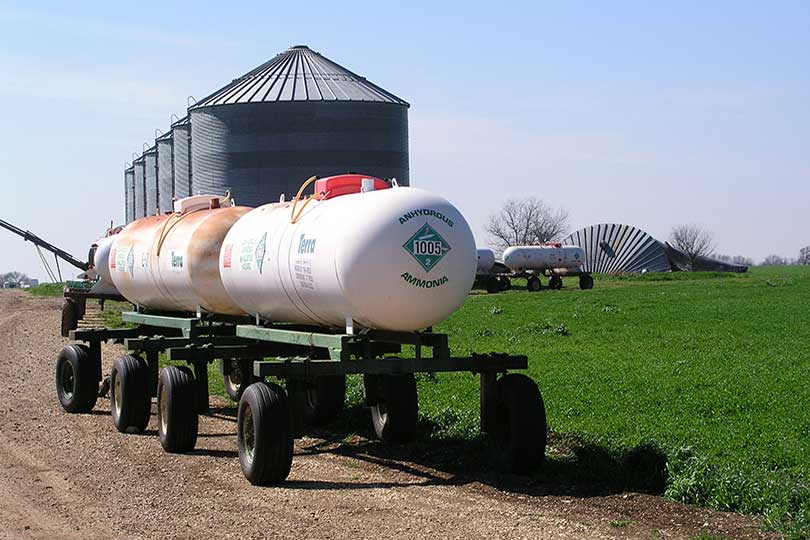By Jessica Domel
News Editor
New fertilizer regulations are taking their toll on Texas.
Since the Environmental Protection Agency (EPA) started requiring anhydrous ammonia dealers to have a risk management plan, more and more outlets have stopped handling the fertilizer altogether.
Many sold their remaining supplies to local farmers who, in return, became more or less a dealer of the fertilizer to friends and neighbors in need of fertilizer.
That’s where the problem lies, according to Donnie Dippel, president of the Texas Agricultural Industries Association.
“They cannot resell it unless they are a dealer,” Dippel said.
To sell anhydrous ammonia to another person, the seller must register with the Feed and Fertilizer Control Service to become a dealer. He/she would also be required to have an EPA risk management plan and file a Tier 2 report with the Texas Commission on Environmental Quality.
Without meeting the required criteria, farmers face stiff penalties.
“A lot of this came about because of the West explosion. Ever since the West explosion, our sleepy industry has become a major part of EPA, OSHA (Occupational Safety and Health Administration) and all of these different regulatory agencies,” Dippel said. “This has really put a light on the total fertilizer and chemical industry.”
A farmer in the San Antonio area was recently fined by the Texas Department of Transportation for not having the proper documentation on a nurse tank used to haul anhydrous ammonia.
He was fined over $25,000, according to the San Antonio Express- News.
“There’s so many requirements on those nurse tanks that if you have a crack even on the frame of a nurse tank, you have to have a certified R welder do the welding,” Dippel said. “If you do that and don’t have it certified, you can be fined. Farmers are exempt from a lot of these things, but once you become a dealer, that puts you under a different category.”
Farmers also face penalties if anhydrous ammonia isn’t stored or applied correctly.
“Anhydrous ammonia is a totally different creature than any other fertilizer,” Dippel said. “Anhydrous is a gas, and it takes the oxygen out of the air. If it would have been the problem at West, it would have put the fire out because it would have sucked all the oxygen out of the air. If you get it in your lungs, it just burns your lungs, and it will burn your eyes and any place there’s moisture. It’s deadly.”
Although there are alternatives to anhydrous ammonia, sometimes it is simply cheaper, Dippel said.
“It’s just another alternative for them to have,” Dippel said. “You’ve got to handle it properly. You have to know what you’re doing. You’ve got to be aware of what your surroundings are. If it’s handled properly, it’s not a problem. You’ve got to make sure that the people who are around it know what it does and also that you have good equipment and good connections so it doesn’t escape from you in any way.”
Anhydrous ammonia, a mixture of hydrogen and nitrogen, is compressed into a liquid and used to fertilize corn, grain sorghum, wheat and cotton in Texas.
Following the 2013 explosion at the West Fertilizer facility in West, Texas, lawmakers in both Washington, D.C. and Austin presented legislation in an attempt to prevent future disasters.
One bill, by State Rep. Kyle Kacal and Sen. Brian Birdwell, requires ammonium nitrate dealers to allow state fire officials to inspect facilities. It also limits how closely fertilizer can be stored to other buildings and flammable materials.
Some rules and regulations are also changing in relation to ammonium nitrate and anhydrous ammonia.
On Friday, Sept. 23, the U.S. Court of Appeals for the District of Columbia rolled back OSHA regulations that would have cost smaller fertilizer dealers between $20,000 and $30,0000 annually, according to Dippel.
The court rules OSHA did not follow required rule-making procedures in reclassifying sellers of anhydrous ammonia as wholesalers.
The move would have required small fertilizer dealers to follow Process Safety Management standards and other regulations.
“It would’ve dealt a blow to anhydrous ammonia dealers,” Dippel said.
OSHA, according to the San Antonio Express-News, has stated it was only interpreting an existing standard. OSHA has 45 days to requ


Pretty soon no one will want to weld on an anhydrous trailer and the cost will skyrocket even further. I believe in regulation but any competent welding shop should be allowed to make the repair on a trailer chassis. The tank, however, is another story!
government has too much say so in everything we do. regulations is ok just don’t go
to far.